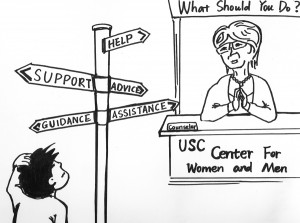Colleges must improve marketing of sexual assault resources
Imagine you’re a company owner and you’ve created a fabulous new line of toothpaste, but it’s doing terribly in stores. While Crest and Colgate fly off the shelves, your little shiny tubes remain. Then, it finally hits you: No matter how great a product is, it’s not going to matter if people don’t know about it. Enter Marketing 101.
But marketing doesn’t only apply to corporations and toothpaste sales. Excellent marketing is necessary for the success of any idea. And though USC is a perfect example of great marketing and promotion (just think back to your first tour of the campus, your first university brochure, etc.), there are places where USC lacks in its promotional abilities. Namely, the promotion of sexual assault resources.
The Obama administration recently launched its initiative to reevaluate sexual assault policies on college campuses.
On Feb. 18, Vice President Joe Biden “chaired the first of nine ‘listening sessions’” of his White House Task Force to Protect Students from Sexual Assault, according to CBS News.
“I’m here to listen,” Biden said during the first session. “I want you to tell me what you think works on your campuses in your experience, what’s not working in your schools, what we should be doing that we aren’t doing, what we are doing that is not making much sense.”
With sexual assault at the forefront of national discussion, it’s important to evaluate how we can improve sexual assault policies on college campuses across the nation, but particularly here at USC. Though we have a plethora of incredible resources, many students might not know that these resources even exist. Sexual assault resources, specifically, remain in the most dire state.
Googling “sexual assault at USC” brings up the university’s Sexual Assault Resource Center website. The website is too simple. The current presentation of information, which is a bullet-point list of steps to take and paragraphs of overwhelming text, is unwelcoming to the user.
By random selection, I chose to look at a few other top-tier universities and their approach to sexual assault resources. I found that Duke, Stanford, UCLA and even Harvard suffered from the same, mundane presentation of facts.
But here’s the thing — topics such as consent or sex don’t have to come across as bland and boring. It only makes them even more taboo.
Emily McFadden, a columnist at the University of Washington’s campus newspaper The Daily, wrote, “Hot lines and counselors are readily available … however, the barrier that separates availability from use [is] the stigma, and oftentimes judgment, that is associated with sexual assault and abuse.”
Making information visually appealing, and properly marketing it to the student body, is a critical step in breaking such barriers.
Let’s start with the notion of revamping USC’s Sexual Assault Resource Center website. The aesthetic appeal and design of any product — whether it’s a new phone or a resource website — make it more user-friendly and less intimidating.
Furthermore, people are visual learners — it’s one of the many reasons why we are so receptive to television advertising. When we see and hear something rather than read it, we have a tendency to absorb the information more steadily. As more of our senses are engaged in the learning process, we retain the information.
As part of the Obama Administration’s endeavor to address the issue of discussing sexual assault on college campuses, the task force will sponsor eight online seminars to receive input on how to best improve these practices and policies across the nation. With the national spotlight on this serious issue, USC must take this opportunity to examine the way it addresses sexual assault. The university cannot treat the problem behind closed doors. It’s the university’s responsibility to brand sex and sexual assault in such a way that it’s no longer taboo. It’s time to bring the topic center stage.
Rini Sampath is a sophomore majoring in international relations. She is also the Online Editor at the Daily Trojan. Her column, “Leaning In,” runs Mondays.



One marketing trick is to not alienate half your customer base, something sexual assault awareness campaigns fail to do. Men are not just a tiny fraction of victims; stop ignoring them.